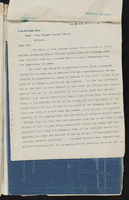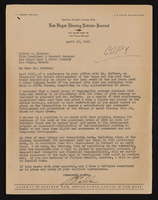Search the Special Collections and Archives Portal
Search Results
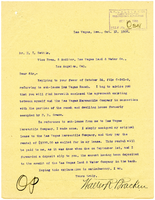
Letter from Walter R. Bracken to H. I. Bettis, October 13, 1908
Date
Archival Collection
Description
Text

Letter from Fonds Social Juif Unifie (Paris, France) to Maurice Halfon (Bronx, New York), June 28, 1962
Description
Letter from Fonds Social Juif Unifie (Paris, France) to Maurice Halfon (Bronx, New York), requesting documentation for his reparations claim.

Costume design drawing, two female dancers in pink harem costumes for Pzazz! 68, circa 1967-1969
Date
Archival Collection
Description
Attached to the upper corners of the drawing are different shades of pink fabric swatches for the costumes. Sketches of nudes are on the back.
Costume Details: Two female dancers in pink harem costumes. The performer on the left is dressed in a two-piece costume consisting of a golden, beaded bra and a long, flowing skirt completed with gold detailing and pink and orange hues. She wears a matching headdress and has both arm and writ cuffs. The woman on the right wears a similar costume, except instead of a flowing skirt she is wearing a flowing pair of pants tied with a pink belt around the waist. The outfit is paired with a golden bra, arm and wrist cuffs, and a matching headdress that spans the length of her body.
Show Name: Pzazz! 68
Performance Name: To Bing, Bob and Dorothy "With Love!": Road to Morocco
Image
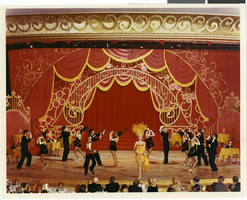
Photograph showing a production of Pzazz! 70 staged by Donn Arden, Desert Inn Hotel, Las Vegas, circa 1970
Date
Archival Collection
Description
Show Name: Pzazz! 70
Performance Name: Chicago: Club Royale
Image

Photograph showing a production of Pzazz! 70 staged by Donn Arden, Desert Inn Hotel, Las Vegas, circa 1970
Date
Archival Collection
Description
Show Name: Pzazz! 70
Performance Name: New York-A Salute to Duke Ellington
Image
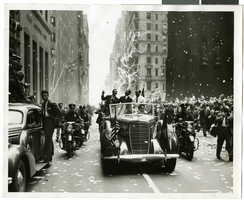
Photograph of Howard Hughes and his crew at a parade, New York, July 15, 1938
Date
Archival Collection
Description
Image
